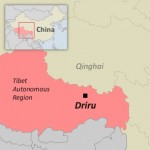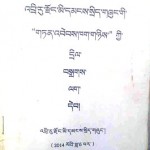The violence which has characterised Chinese rule in Tibet since 2008 became apparent again last week as reports surfaced confirming the extrajudicial killing of a revered village leader in Driru County.
Sources close to the Dharamsala-based Tibetan Centre for Human Rights and Democracy (TCHRD) revealed last week that Bachen Gyewa, the leader of Ushung Village in Nagchu (Chinese: Naqu) Prefecture’s Driru (Chinese: Biru) County was murdered shortly after his detention by local authorities. Gyewa, also known as Ngawang Monlam, was removed from his post, arrested, and killed by security personnel while in the custody of county police on November 21. Sources allege that the killing was ordered by the Secretary of the Party Committee of Driru County.
Shortly after Gyewa’s death, communications and travel restrictions were imposed on the county and residents were forced to sign agreements not to share information regarding Gyewa’s death. Villagers showing sympathy for Gyewa’s death were detained by police and held indefinitely at the Driru County Detention Center.
Sources indicate that Gyewa’s commitment to Tibetan unity, successes in leadership, and background as a former monk at a fiercely independent local monastery made local government increasingly uneasy, and motivated his killing. Gyewa is described by village residents as an outstanding leader dedicated to the economic, educational, and cultural well-being of the community. He is credited with the construction of a school for illiterate children and elders, a hospital, a community centre, and the organisation of cultural performances, prayer services, and teachings by Buddhist lamas.
Gyewa’s killing follows the recent introduction of 59 regulations intended to subdue the long restive county, which in recent years has strongly resisted forced displays of loyalty and government attempts to ensure the “political stability” of the region. Consequences for the county have been severe: in the last two years alone, Driru has witnessed multiple instances of arbitrary detention, arrest, shootings of peaceful protestors, enforced disappearances, collective punishment, and extrajudicial killings. Most recently, in June this year Driru County authorities threatened to dispel monks and nuns from local monasteries and hold the livelihoods of Tibetan residents ransom if they did not accede to new regulations restricting participation in a Buddhist prayer festival.






 Print
Print Email
Email